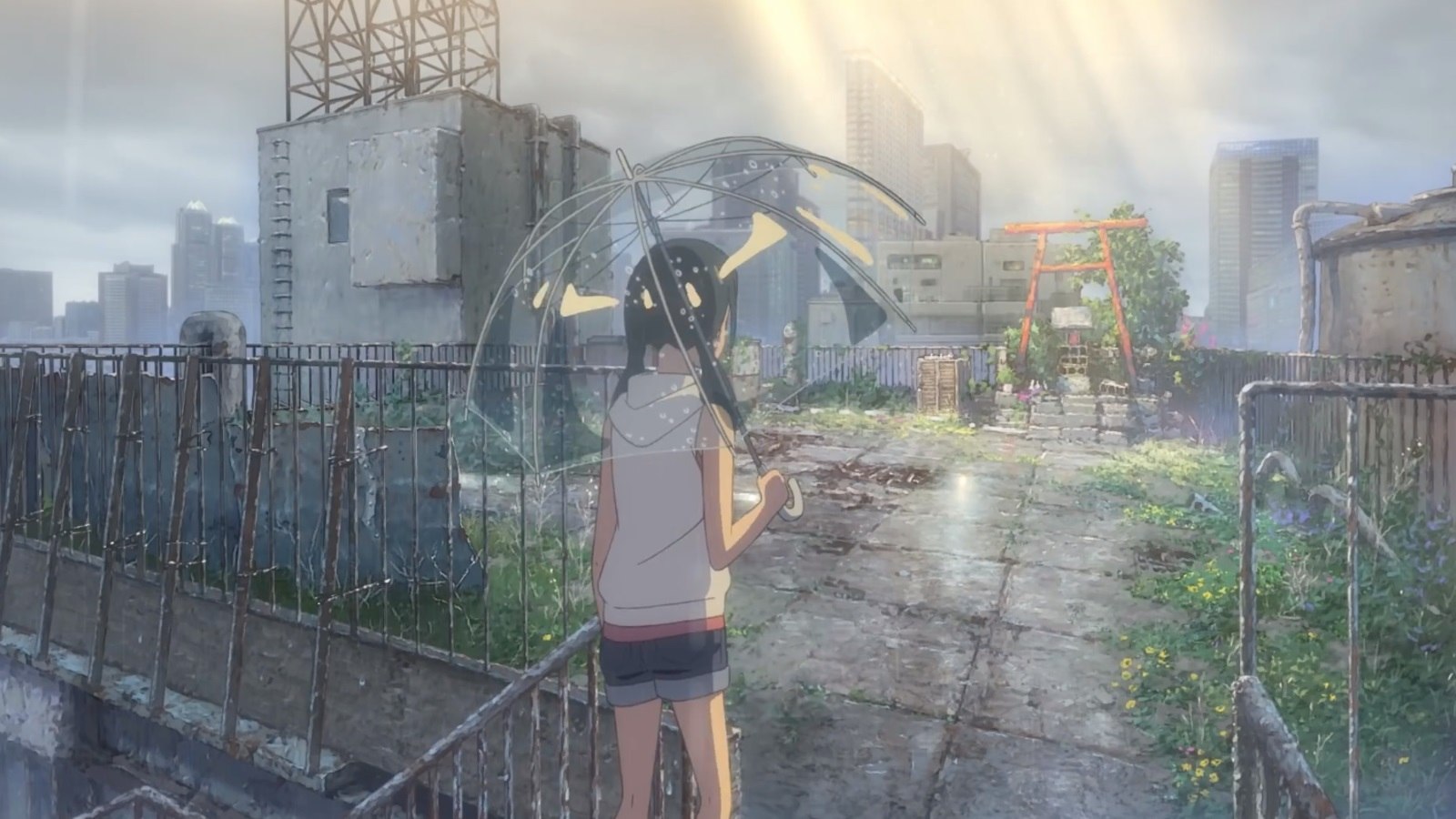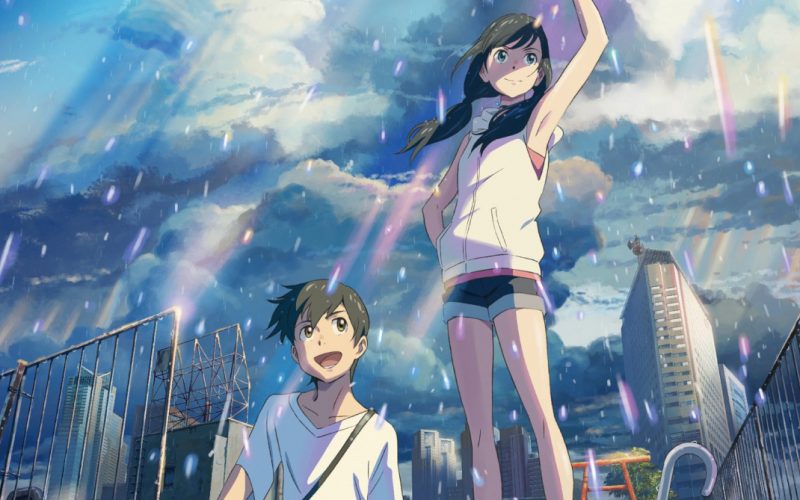Weathering with You (2019).
Is Makoto Shinkai’s latest film ‘Weathering with You’ stylistically consistent or simply rote?
Makoto Shinkai’s follow-up to his 2016 mega-hit Your Name has a lot of pressure stacked on top of it. Weathering with You harbours many of the characteristics that Shinkai seems particularly fond of – young love, life in the big city, the pain and the passage of time – but the ties that bind his latest two films in particular are inescapable despite their distinct premises that suggest otherwise.
In Your Name, Mitsuha is a resident high school student in the fictional coastal town of Itomori. Taki is also in high school, though he lives many miles away in Tokyo. The two discover that when they wake up in the morning they switch bodies, and they must begin to communicate to one another through messages so that the disruption to one another’s life is as minimal as possible. When Taki suddenly stops switching places with Mitsuha, he learns that her home town was the victim of a stray comet that destroyed it and its inhabitants five years ago.
In Weathering with You, Hodaka has run away from home to live in the big city of Tokyo. Still a minor at sixteen years old, he finds it hard to find a job or a place to live and spends some time on the street. One day he encounters Hina, an orphan who looks after her younger brother and, more notably, is able to manipulate the weather and bring sunlight down on the rain-soaked city. They eventually discover that there’s something greater at play for Hina, something with dire consequences, and Hodaka is racked with guilt when she disappears overnight.

Makoto Shinkai’s 2016 and 2019 films are both romantic fantasies. They’re intricate love stories first and foremost with unique concepts tied to religion and spirituality set mostly within a present day Tokyo with environmentally-conscious themes tying into the state of the city. Both are as heartbreaking as they are funny and as awe-inspiring as they are emotionally affecting. Shinkai’s mastery of character design and development makes for leads that feel so real we could reach through the screen and touch them. Sometimes we might want to if only to console them. The thread that connects Mitsuha and Taki in the time travel-lite world of Your Name is not so different to the thread that ties these two films together as creative products. I’d argue that this connection is even stronger than that shared between the characters themselves. Though not detrimental, this comes at a cost.
Shinkai’s trademarks are all here. His mastery of frantic editing particularly regarding the boisterous montages he’s so fond of, his expertly crafted primary and secondary characters, and a dazzling, vibrant visual style all make for two films both admirable and fixating. So many details sit within every frame. The sound design is precise, the fall of the rain and its colliding with the pavement in Weathering with You as hypnotizing as the wind brushing the grass in the hills of Your Name. Radwimps is the artist behind the music on both films – the cues so undeniably familiar between both – and its a perfect match for the heart-wrenching drama and the wholesome hilarity that ensues within the beautiful dynamics shared between Shinkai’s characters. There are repeated musical themes that return in Weathering with You, albeit with minor adjustments, that cause some pause, but the inspiring visual moments in both films are often heightened by its soaring soundtrack.

The Mitsuha of Your Name and the Hodaka of Weathering with You share a deep, nagging urge to find something more for themselves within the metropolis of their dreams. Tokyo is treated and visualised with a sense of wonderment despite Shinkai still subtly commenting on the abundant, undeniable human impact on the natural world. Regardless of his understandable insistence on avoiding the comparison, this aspect of his work is something he shares with the great Hayao Miyazaki. The literal reality of Shinkai’s films though is far more recognisable and less otherwordly than those famous Studio Ghibli films. Imbuing the real world with larger-than-life concepts is a tried and true dramatic setting and Shinkai digs deep into lore and mythology to find an angle from which to enliven that real world with the surreal.
In Your Name, Mitsuha is symbolically sacrificial, the victim of a turning point that makes the story more-so Taki’s than hers. In Weathering with You, Hina is a literal sacrifice, given an option that proceeds to strip her of her agency and turn the story’s gaze wholly toward Hodaka. In both plots, the teenage boy becomes the “tragic figure”, pining for a lost love and desperately attempting to save them. In both films there’s a resistance to authority, as well as perhaps an idealistic definition of love that binds the destinies of its male and female characters. Is Shinkai, by sidelining the leading ladies of both films for a time in the crucial latter half of each, simply writing what he knows? Whether or not this is the case, both choices in their respective screenplays turn the story into a teenage boy’s fantasy, a traditional tale of the prince rescuing the damsel in distress. While I don’t believe these films quite succumb to this kind of storytelling, the kind that finds itself ridiculed in contemporary media, there’s certainly elements of it in the way in which the boys are afforded the opportunity to save the day.

There’s an alluringly casual way in which not only Shinkai but other prominent Japanese filmmakers treat the relations between genders. In both Your Name and Weathering with You, the physical attractions and distinctions between man and woman are embraced in ways that might just be ridiculed in western counterparts, but it’s so effortlessly inoffensive so as only to be endearing here. The natural contrast between the genders is treated with innocence, in neither case feeling exploitative often thanks to the comfort and confidence with which characters, particularly females, carry themselves.
The youthful exuberance of the teenagers in both films is idealistic, in a way I think the adults in both films envy or, in some cases, ridicule. Sometimes it’s both, as with Kei, a freelance editor who takes Hodaka in and gives him work. Kei is a prime example of Shinkai’s careful character building, a member of a cast that could easily have been half-written but is instead granted a sympathetic backstory giving credence to his decisions late in the film. In Your Name, Taki and Mitsuha mostly seek help from others their own age and meet mainly resistance from adults. Hodaka however, must rely on the kindness of more financially capable members of the Tokyo population who themselves are pulled into his brush with authority in Weathering with You. The stakes in this regard are higher for Hodaka because as much as the fantastical conflict drives his story he also becomes the target of law enforcement.

Taki and Mitsuha of Your Name actually cameo in Weathering with You, suggesting that Shinkai’s entire body of work is set within the same shared world. This he treats with a light touch, not so much forcing the idea but treating observant fans without any suggestion that there might come a time when these characters share the spotlight in a future film. If I had any doubts that Shinkai was carrying the structure of Your Name almost without alteration into his latest film, they dispersed with a late time skip, a bittersweet epilogue taking place in both films after a natural passage of time that gives us a glimpse of the world after the characters experienced their life-altering events and how their lives were affected in the interim.
As for which is the stronger film, it’s a little harder to say. Considering the overwhelming similarities between the two technically and structurally, they each exhibit elements that feel stronger in one than the other without compromising the quality of either. Weathering with You will unfortunately fall under the shadow of Your Name as an astonishingly similar follow-up. It creates a debate of its own. If Your Name found such immense success, why not capitalise on some of those same qualities for a brand new narrative? Shinkai has long since found a style that works for him, though more-so in Weathering with You than with Your Name it reveals itself to be somewhat limiting. Where Your Name needn’t delve too far into its concept and in fact benefits from ambiguity, Weathering with You suggests a mythology that’s left behind in a final act that’s paced with an absorbing amount of tension but does away with the backstory that, upon reflection, exists as wasted potential and, at worst, meaningless exposition.

These two films are not Shinkai’s only works in a body that dates back to the late 1990s and early 2000s, but he has grown into a prolific filmmaker who may soon, if he has not already, find himself in the company of other revered Japanese directors. But these two in particular are a fascinating pair of films that share so many similarities and notable stylistic qualities. As a result, both films will capably lead viewers from one to the other. Conversely, if one is not for you, the other is unlikely to suit your tastes. My eyes will be firmly fixed on his next project as he continues to grow his unique corner in the anime world. There is some hope though that perhaps he’ll change the approach the next time around and produce something drastically different to these two masterfully crafted films.
Film ‘89 Verdict – 8/10
Weathering with You is currently on limited theatrical release in Australia and some other territories and makes its North American debut at the Toronto International Film Festival September 8th 2019.

